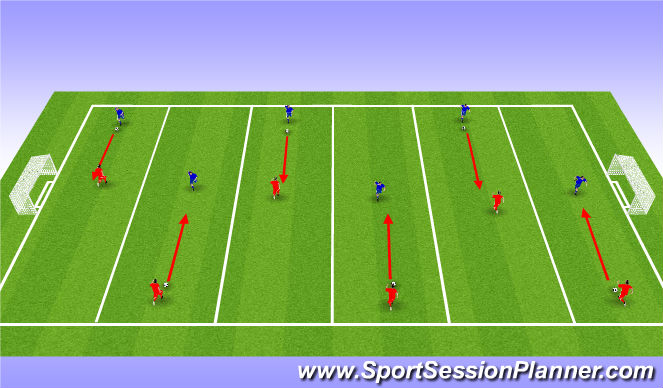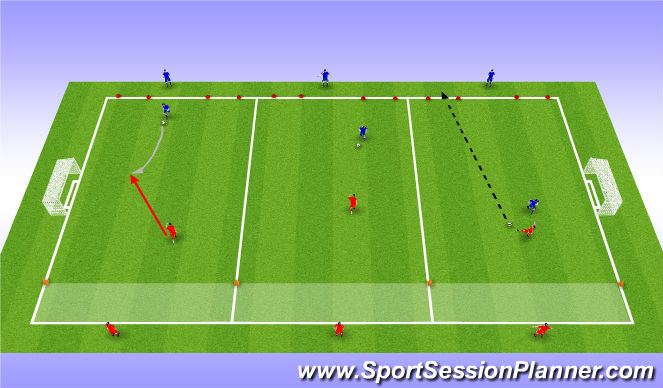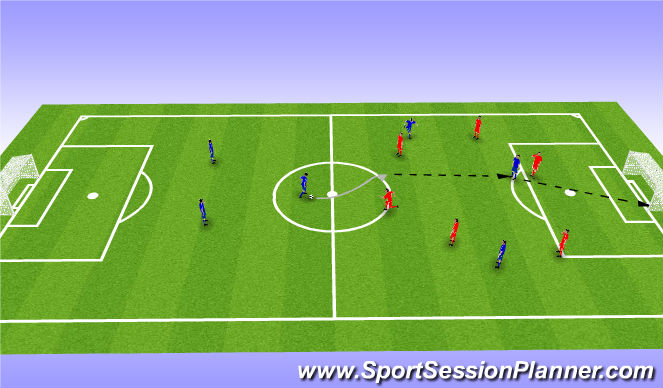Football/Soccer Session (Beginner): Defending 1 vs 1

Profile Summary

| Name: | Cameron Higgins |
|---|---|
| City: | Derby |
| Country: | United Kingdom |
| Membership: | Adult Member |
| Sport: | Football/Soccer |
Description
Session topic: Defending 1 vs 1
Learning objectives:- Be able to effectively jockey a player 1 vs 1.- Be able to judge when to go in for a tackle when defending 1 vs 1. - Be able to force the attacker one way or the other when defending.
Player information:- 12 players - 5-11 years old - Mixed ability
Session length: 1 hour
Order of practices: Blocked, Variable, Random (SSG).
Equipment:- 6 balls - 12 bibs (2 different colours for both teams)- Cones/markers- 2 goals or poles

See the guidance at the top of this page to understand why you are not seeing interactive Football/Soccer images.

Learning Objectives

|
Technical Defending technique, jockeying, tackling. |

|
Tactical N/A |

|
Physical Jockeying and running can be quite tiring for long periods. |

|
Psychological Targets and challenges set for the players. |

|
Social Players working in pairs. |

See the guidance at the top of this page to understand why you are not seeing interactive Football/Soccer images.

Learning Objectives

|
Technical Defending technique, jockeying, tackling. |

|
Tactical N/A |

|
Physical Jockeying and running can be quite tiring for long periods. Tests players fitness levels |

|
Psychological Targets, challenges and conditions ste for the players to give them something to aim for. |

|
Social Players are now working as teams rather than in partners. Can introduce team captains. |
Variable (20 mins)
Organisation:
- 20 minute practice
- 12 players (5-11 years old)
- Each area is 20 x 15 yards
- Players get into pairs and set up as shown in the diagram
Equipment:
- Cones/markers
- 6 balls (2 for each group)
- 12 bibs (6 blues, 6 reds)
Description:
- The attacker (blues) starts with the ball and dribbles towards the end zone, similar to what they did in the first practice.
- The defender (reds) must close the attacker down and get the ball away from him.
- When the defender wins the ball, he/she must look to pass or dribble the ball through one of the gates set up where the attacker started, as shown in the session diagram.
- The attackers should continue attacking, alternating between the pair for 2 minutes before swapping roles as the attackers and defenders.
Progressions:
- Can give the attackers a time limit to dribble the ball into the end zone, this will then make the attackers become more direct making it more difficult for the defenders to deal with. This gives the defenders a bigger challenge.
- Can introduce a competition between the reds and the blues. The team with the most points wins. The way they can earn points is by winning the ball back from the attacker or if the attacker takes too long to dribble the ball into the end zone.
Conditions:
- Time limit for attackers to dribble into the end zone, for example, 15 seconds.
Challenges:
- As a defender, can you block the attacker from crossing the end zone, forcing him over the time limit?
- As a defender, can you win the ball from the attacker within 10 seconds of the attacker starting?
Targets:
- Team target; can you earn 10 points as a team when defending?
Coaching interventions:
- Fly-by: give players tips and pointers on how to jockey an attacker. Give feedback to establish understanding of how to defend effectively.
- Drive-by: pull individual players out who are in pairs and may be struggling. Can demonstrate to them step by step the defending technique going through each coaching point thoroughly. Allow them to rehearse back to you to make sure they have taken everything in and understood it before allowing them to join back in with the practice.
Coaching process: can step in in-between practices to make sure player understand the coaching points when defending. Knees need to be bent and they must stay on their toes to be able to adjust their body shape quickly. Defenders should also approach the ball side on and so these points should be emphasised across to the group of players giving feedback and showing demonstrations. Can also allow some of the players to demonstrate to the group as well, doesn't always have to be the coach.

See the guidance at the top of this page to understand why you are not seeing interactive Football/Soccer images.

Learning Objectives

|
Technical Defending technique, jockeying and tackling. |

|
Tactical Team games, team meetings to be held to discuss tactics during the game. Barcelona vs PSG can promote tactical thinking. |

|
Physical Lots of running and defending during a small-sided game. |

|
Psychological Conditions, targets and challenges set for the players, Barcelona vs PSG can promote tactical thinking. |

|
Social Teams need to co=operate with each other in order to win the game, can introduce team captains to lead team meetings. |
SSG (20 mins)
Organisation: - 20 minute practice- 12 players (5-11 years old) - 40 x 30 yard area - Two teams of six, no goalkeepers
Equipment:- Cones/markers- 1 ball in play - Other balls scattered around the outside- 12 bibs (6 blues, 6 reds)- 2 goals or poles to set up the goals
Description:- A small-sided game with normal football rules, however, both teams start without a goalkeeper. This emphasises to the players the importance to defend well. - Players should choose a partner from the opposite team before the game starts. This is the player they have been allocated to man-mark throughout the game for a certain period. - If a player scores a goal, that player's partner must touch at least two corner flags before returning to the game. This then gives the team who just scored a numerical advantage for a short period of time, emphasising the importance of defending well as a team and as individuals.
Progressions: - Can progress to where players are now only allowed to score inside the penalty area. - Can progress to where players are only allowed to tackle their partners. - Can put the players in the Barcelona vs PSG scenario where the team who are PSG must discuss defensive tactics in order to see out a 3 goal advantage with 5 minutes to go. Barcelona must discuss their tactics to decide how they are going to break PSG down.
Conditions:- Players are only allowed to score inside the penalty area. - Players can only tackle their partners. - Can players think of their own conditions to put on the game?
Challenges:- How many 1 vs 1 battles can you win against your partner?
Targets:- Team target: after conceding a goal, can you prevent the other team from scoring again before your teammate returns back to the field of play.
Coaching interventions:- Fly-by: give players tips and pointers on how to jockey an attacker. Give feedback to establish understanding of how to defend effectively.- Drive-by: pull individual players out who are in pairs and may be struggling. Can demonstrate to them step by step the defending technique going through each coaching point thoroughly. Allow them to rehearse back to you to make sure they have taken everything in and understood it before allowing them to join back in with the practice. This will also give the other team a numerical advantage for a short period of time so it will be interesting to see how the team short in numbers responds tactically. - Coaching process: can step in and use this process when a team or an individual makes a wrong decision.








 Play animation
Play animation Play step-by-step
Play step-by-step Repeat (toggle)
Repeat (toggle) Full Screen
Full Screen Pause
Pause Stop
Stop
Blocked (20 mins)
Organisation:
- 20 minute practice
- 12 players (5-11 years old)
- All players are set up in pairs as shown in the session diagram
- Each pair has a ball between them
Equipment:
- 6 balls
- 12 bibs (2 different colours, 6 of each)
- Cones/markers
Description:
- The player with the ball is the attacker, the player without the ball is the defender. The attacker should dribble from one end of the area to the other without beating the defender. The attacker should only shift the ball in different directions to force the defender to shift his/her body shape.
- The job of the defender is to keep the attacker and the ball in front of him/her, blocking the ball from getting past him/her. The defender should not be trying to tackle the attacker.
- When the attacker reaches the end of the area, their roles are now reversed.
Progressions:
- Challenge the attackers to dribble at the defender at a match tempo, which forces the defender to shift their body shape quicker than before. Defenders should still be passive rather than tackling the attacker at this stage.
- Can introduce a competition between the partners, every time the defender wins the ball from the attacker they win a point and vice versa. If the attacker reaches the end line without losing the ball then the attacker wins the point. Can do this for 1-2 minutes before moving on to the next practice.
Conditions:
- Defenders should remain passive until the last progression where they are allowed to tackle the attacker with the ball.
Challenges:
- Challenge the attackers to dribble at a match tempo, forcing the defenders to defend at a higher tempo and quality.
Coaching points:
- Keep your eyes on the ball.
- Close down the attacker quickly, slowing down as you approach him/her.
- Get low down when jockeying keeping the knees bent and remaining on toes.
- Wait for a poor touch before lunging in for a tackle.
Coaching interventions:
- Fly-by: give players tips and pointers on how to jockey an attacker. Give feedback to establish understanding of how to defend effectively.
- Drive-by: pull pairs out to work with them individually. Can show them demonstrations step by step on how to defend effectively when jockeying. Can allow them to rehearse slowly to further establish understanding of how to defend.